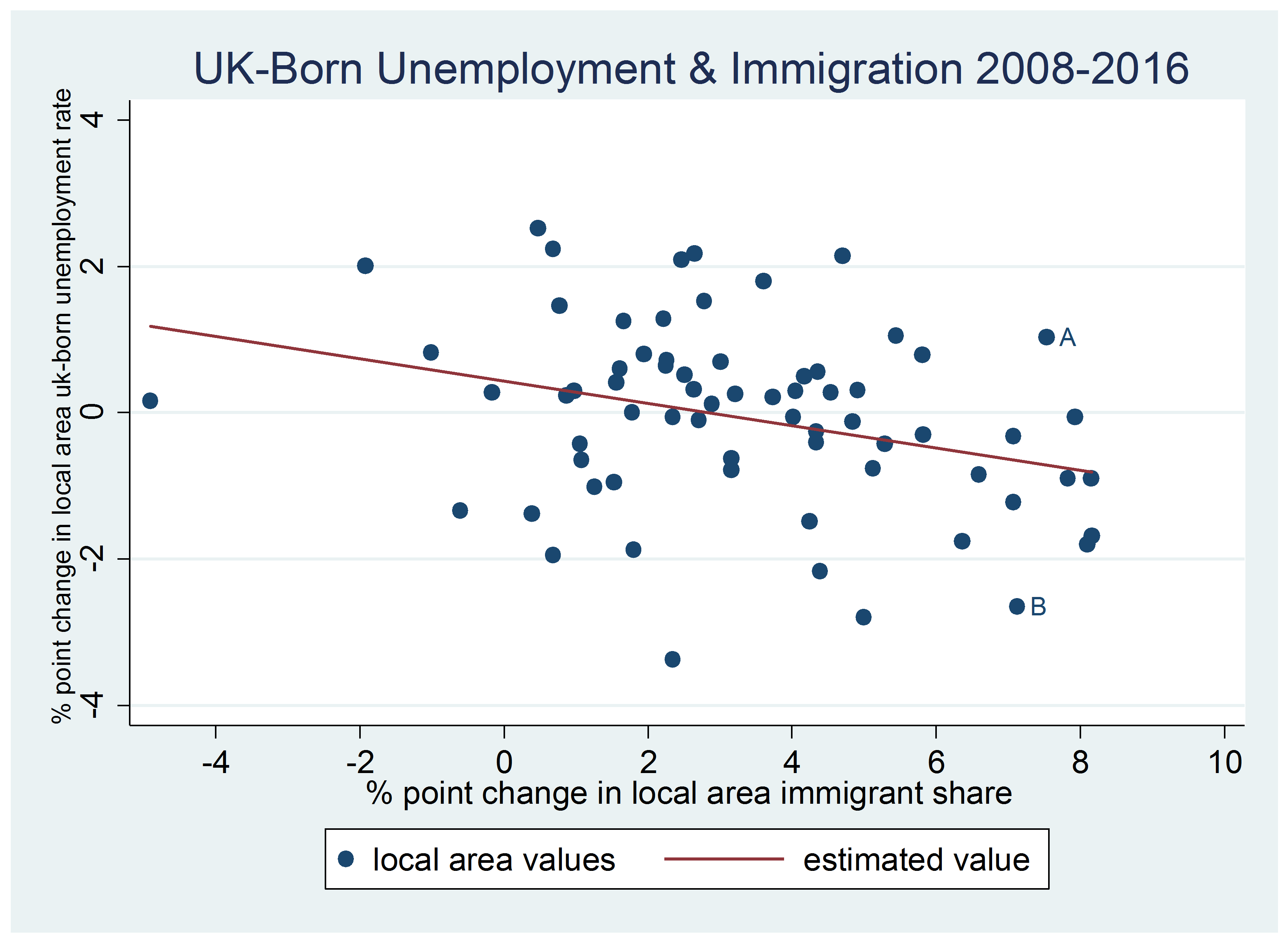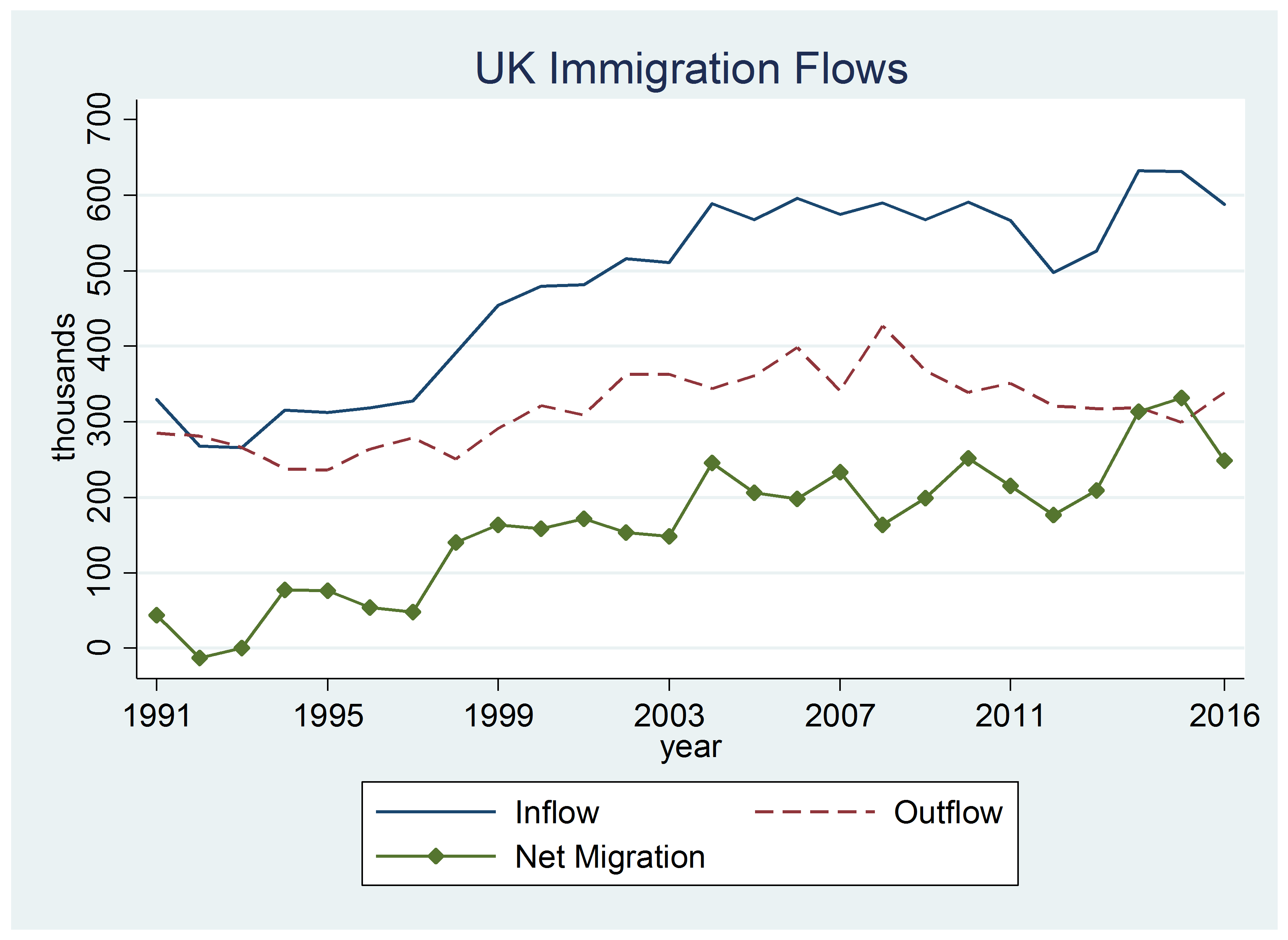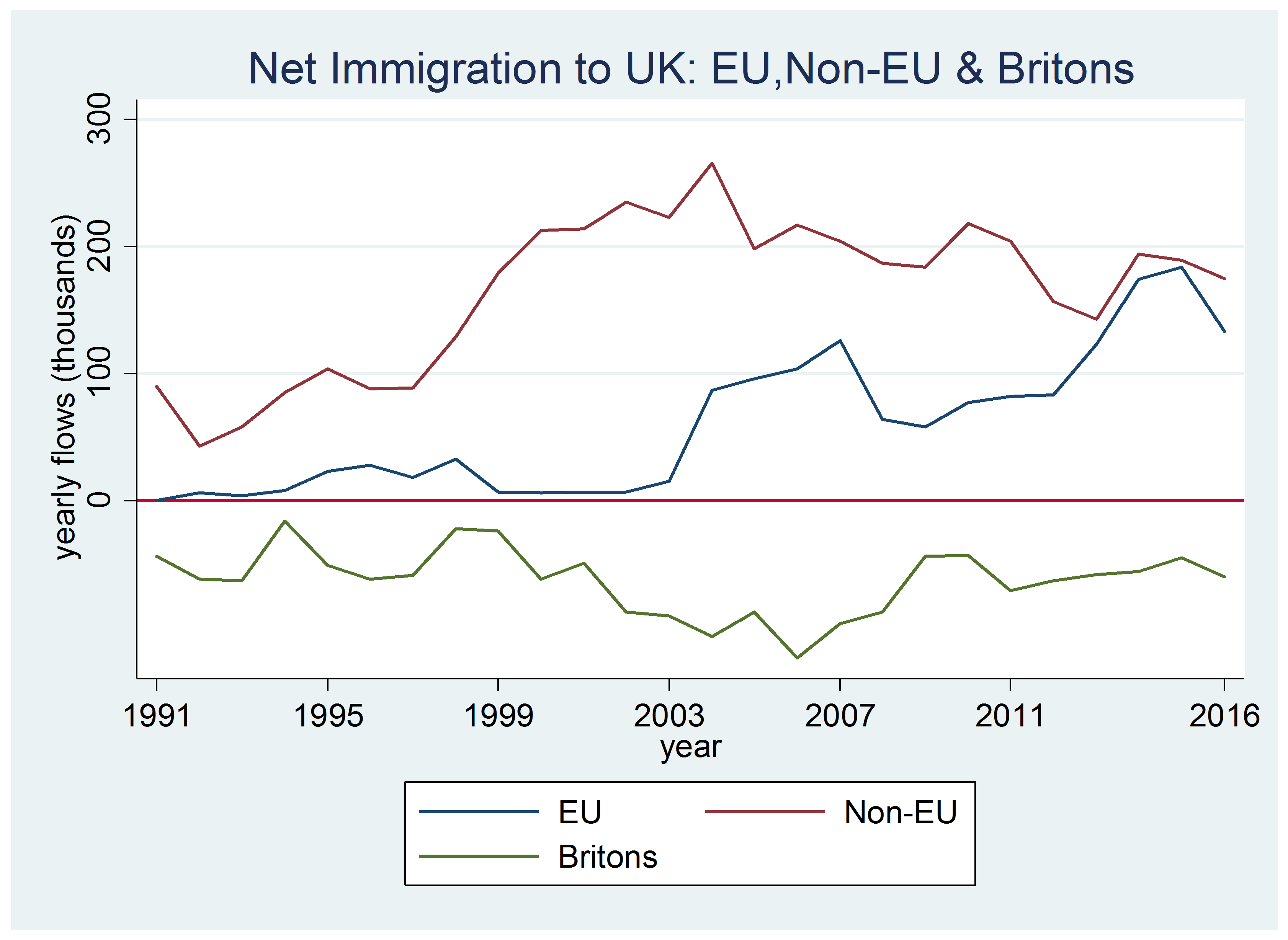 The net migration target is one of the strangest political fetishes of modern political history, writes Jonathan Wadsworth. He argues that it is far from obvious why any government would seek to target something over which it has very little control. Even if migration from the EU fell to zero, the net migration numbers would be way above the 100,000 target. He concludes that the evidence of immigration’s impacts in the UK is that it seems to matter much more politically than it does economically.
The net migration target is one of the strangest political fetishes of modern political history, writes Jonathan Wadsworth. He argues that it is far from obvious why any government would seek to target something over which it has very little control. Even if migration from the EU fell to zero, the net migration numbers would be way above the 100,000 target. He concludes that the evidence of immigration’s impacts in the UK is that it seems to matter much more politically than it does economically.
Had things gone as most commentators expected, the UK would now be entering hard Brexit talks with the near certainty of leaving the single market and/or customs union and the consequent ending of free movement of people from the European Union. Over one week later and that near certainty no longer seems as certain, with murmurings of a softer Brexit and the implication that allowing freer movement of labour from the EU may now be up for discussion. Yet any rowing back on ending free movement would immediately conflict with the net migration target of 100,000 – a key feature of the Conservative party manifesto. If we assume that this is still in play, the continued allowance of free movement from the EU – around half of the net migration number – would obliterate any attempts to hit such a target within a parliament.
The net migration target is one of the strangest political fetishes of modern political history. While sensible arguments could be made for placing some restrictions on immigration – no country allows unrestricted migration – it is far from obvious why any government would seek to target something over which it has very little control. Simply put the net target is the result of the difference between the numbers of migrants coming into the UK and the number leaving. The government can currently control, at best, around half of the inflow – that from outside the EU. Even that is moot since student numbers, the majority of entrants from outside the EU, are not regulated. With a hard Brexit, it could potentially control the other half of the inflow. With or without Brexit it can not and will never have, any control over the numbers leaving. Yet changes in these uncontrolables can and do affect the target.
 Image by hataratkelo.
Image by hataratkelo.
A good example of this underlies the recent fall in net migration, shown in Figure 1 below. Undoubtedly net migration has fallen considerably (by around 100,000) over the past year. The irony is that this fall is mostly driven by factors over which the government has no control – namely a rise in the number of EU (mainly A8) migrants leaving the UK and a rise in emigration of British citizens (the green line in the second panel is below zero which means net emigration of British citizens).
Figure 1: UK Immigration Flows, 1991-2016
Source: ONS (2017)
Going forward, if the UK economy stalls while many of the EU economies grow more rapidly then there may be further falls in the net migration figure – again for reasons beyond government control. Migrants seeking work will be attracted to the best employment opportunities. If there are suddenly more opportunities in mainland Europe we would expect more migrants to choose Germany, France or Spain rather than the UK (the 15 per cent fall in sterling relative to the Euro also makes UK wages 15 per cent less attractive relative to a job in the Eurozone to prospective migrants). So the inflow to the UK could fall over the next few months reducing the net migration numbers without the government having done anything other than preside over a stalled economy.
Even if migration from the EU fell to zero, the net migration numbers would be way above the 100,000 target and require any government intent on trying to hit the target to make some (infeasible) restrictions on student numbers from outside the EU.
there is no positive relationship between immigration and unemployment rates of those born in the UK
But, but, but the real question is whether it matters if immigration comes down a lot or a little. With regard to pay and job prospects, the answer is probably not much. As Figure 2 below illustrates, large rises in immigration had very little effect on jobs (and pay) of either skilled or less skilled UK-born workers. The solid red line summarises the relationship between immigration and UK-born unemployment rates. If immigration increased unemployment, we would expect a strong upward sloping line: more immigrants would mean more unemployment for local workers. It is clear from the graph that there is no positive relationship between immigration and unemployment rates of those born in the UK. If anything, the relationship is negative, suggesting areas with more immigration experienced larger falls in unemployment for the UK-born over this period. Look at two areas – dots A and B in Figure 2. Both have had increases in the immigrant share well above the national average for this period. In area A unemployment for the UK-born has risen by over 1 percentage point, which is also above the national average. So in area A it feels like immigrants are bad for jobs. But area B has had a similar increase in immigration, while unemployment here has fallen by 2 percentage points. Therefore, just because immigration and unemployment both go up in an area does not mean that immigration is the reason for rising unemployment since it is quite easy to find areas where immigration went up and unemployment fell. Something else must underlie the prospects of UK-born individuals in areas with rising unemployment.
Figure 2: Unemployment rates of UK-born and immigration
 Notes: Each dot represents a UK local area. The solid line is the predicted ‘best fit’ from a regression of changes in unemployment on the change in share of immigrants in each UK local area. These are weighted by the sample population in each area. Source: CEP analysis of Labour Force Survey.
Notes: Each dot represents a UK local area. The solid line is the predicted ‘best fit’ from a regression of changes in unemployment on the change in share of immigrants in each UK local area. These are weighted by the sample population in each area. Source: CEP analysis of Labour Force Survey.
And if immigration had little effect when it went up a lot, it is hard to think why or how a large fall in immigration would have any large effects either.
And that is probably the crux of the immigration issue. Immigration matters much more politically than it does economically. All the empirical work that has been done on UK immigration shows very small effects, either positive or negative, though its influences in cultural matters probably extends much further. True any reduction in EU immigration would make paying the deficit off a little harder – since EU migrants pay more in taxes than receive in benefits and public services (whereas UK-born and non-EU migrants receive more in benefits than they pay in taxes), but these net payments are not very big. Certain firms and sectors would also have to look around for different sources of labour or methods of working (though any firm that relies on a never ending supply of EU workers in an environment of free movement has an unstable business model), but the number of sectors affected is relatively small and the adjustment will always be at the hiring margin not the entire workforce.
Perhaps one of the best things that could come out of the election is that we learn to stop worrying so much about immigration.
This post represents the views of the author and not those of the Brexit blog, nor the LSE.
Jonathan Wadsworth is Professor of Economics at Royal Holloway College University of London and a senior research fellow at the LSE’s Centre for Economic Performance. He was a member of the Home Office’s Migration Advisory Committee from 2007 to 2016.









Since you are asking the question, I assume you have not been reading the tabloids for the last 25 years or so.
Because a large proportion of the taxpayers of this country are fed up of people coming into this country who expect to be housed, provided with healthcare and assorted benefits which they have never contributed to but expect to receive and are of no value to the country or society whatsoever.
Karl, EU migrants pay more in taxes than they take in benefits. Never mind the obvious cultural benefits. This entire subject is nonsense, as Jonathan says. Which is why it’s depressing that smart liberals like Keir Starmer indulge it for purely political reasons.
There is no evidence that EU migrants are of net economic benefit to this country and what “obvious cultural benefits” are you thinking of? By the way the article is about immigration per se.
yes there is evidence that EU migrants are of net economic benefit, go read the immigration section of this paper http://cep.lse.ac.uk/pubs/download/ea044.pdf
I disagree that is “infeasible” to reduce the number of student immigrants. It’s entirely possible and is also government policy.
Nick Timothy wrote an article on Conservative Home about the importance of reducing the number of international students because so many marry, get high quality jobs or start businesses here and thereby become longer term immigrants.
Whether or not is is wise to limit student immigrants is of course a completely different discussion.
I agree that the question will become more political as time goes on. Many of the migrants from the EU are doing jobs no-one here has shown much enthusiasm for. In my area sorting refuse in a recycling centre and filleting salmon (not in the same place, I assure you!). Under the Smith Commission Scotland signed up to a scheme whereby our growth rate has to meet that of the UK or the Barnett scheme funding will be clawed back over time. We need migrants to replace the people we lose to England. Now we won’t get them. Signing Smith was profoundly stupid without control over immigration. If the UK as a whole is the laughing stock of Europe then Scotland is a subset all of its own. For a fuller description of what I’m on about see:
https://www.slideshare.net/LoudenDW/scotland-enduring-the-scotland-bill-49523434
this shows what the Scotland Act did and didn’t do. We have little control over our economy and live in a country which will be economically poorer as a result.A Brexit Bonus for us – Better Together . Stop laughing, please!
I suggest that the assumption that lower income people are against immigration because “they are taking our jobs” is lazy, prejudiced, crass, inexcusably simplistic, prejudiced, and intellectually and academically wholly unjustifiable.
Another oddity is that net migration of British nationals is part of the target.
Why?
If it is a worry about the dilution of Britishness, then the sign should be reversed (that is, foreigners coming here dilutes the Britishness of the population, British returning to UK increases the Britishness of the population, unless of course it is felt that having lived abroad they are no longer truly British and therefore belong in the diluting category)
If it is a worry about population, the sign makes sense, but why not look at births and deaths (and proportion of land released for building).
Finally, Theresa May’s argument for why she will not remove international students from the target – “it’s an international definition” – makes no sense. The definition exists for statistical reporting. But no-one obliges the UK to use this number for its target or, indeed, to have a target.